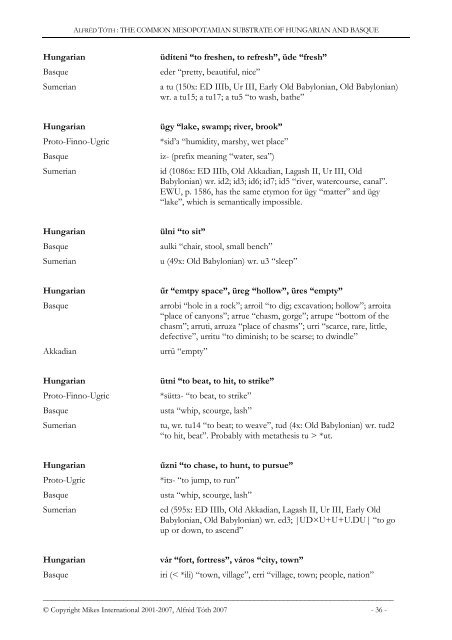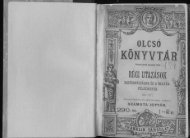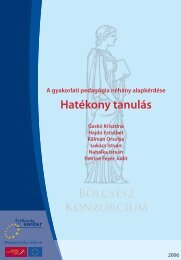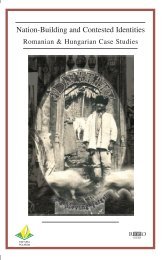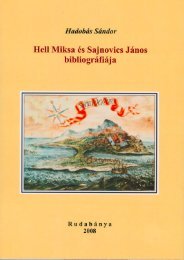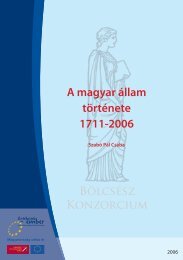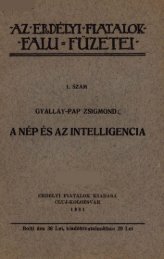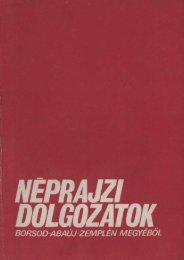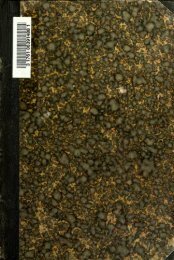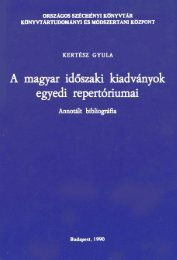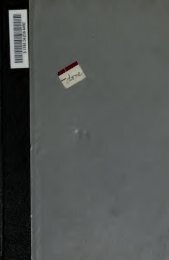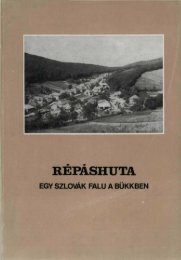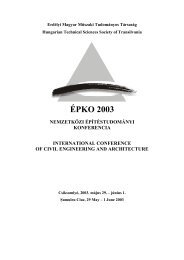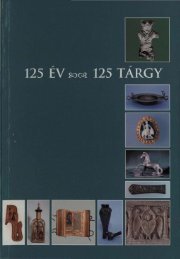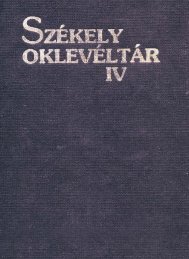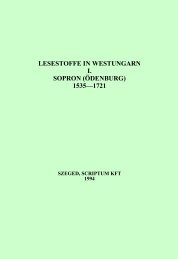The common Mesopotamian substrate of Hungarian and ... - MEK
The common Mesopotamian substrate of Hungarian and ... - MEK
The common Mesopotamian substrate of Hungarian and ... - MEK
You also want an ePaper? Increase the reach of your titles
YUMPU automatically turns print PDFs into web optimized ePapers that Google loves.
ALFRÉD TÓTH : THE COMMON MESOPOTAMIAN SUBSTRATE OF HUNGARIAN AND BASQUE<br />
<strong>Hungarian</strong><br />
Basque<br />
Sumerian<br />
üdíteni “to freshen, to refresh”, üde “fresh”<br />
eder “pretty, beautiful, nice”<br />
a tu (150x: ED IIIb, Ur III, Early Old Babylonian, Old Babylonian)<br />
wr. a tu15; a tu17; a tu5 “to wash, bathe”<br />
<strong>Hungarian</strong><br />
Proto-Finno-Ugric<br />
Basque<br />
Sumerian<br />
ügy “lake, swamp; river, brook”<br />
*sid’з “humidity, marshy, wet place”<br />
iz- (prefix meaning “water, sea”)<br />
id (1086x: ED IIIb, Old Akkadian, Lagash II, Ur III, Old<br />
Babylonian) wr. id2; id3; id6; id7; id5 “river, watercourse, canal”.<br />
EWU, p. 1586, has the same etymon for ügy “matter” <strong>and</strong> ügy<br />
“lake”, which is semantically impossible.<br />
<strong>Hungarian</strong><br />
Basque<br />
Sumerian<br />
ülni “to sit”<br />
aulki “chair, stool, small bench”<br />
u (49x: Old Babylonian) wr. u3 “sleep”<br />
<strong>Hungarian</strong><br />
Basque<br />
Akkadian<br />
űr “emtpy space”, üreg “hollow”, üres “empty”<br />
arrobi “hole in a rock”; arroil “to dig; excavation; hollow”; arroita<br />
“place <strong>of</strong> canyons”; arrue “chasm, gorge”; arrupe “bottom <strong>of</strong> the<br />
chasm”; arruti, arruza “place <strong>of</strong> chasms”; urri “scarce, rare, little,<br />
defective”, urritu “to diminish; to be scarse; to dwindle”<br />
urrū “empty”<br />
<strong>Hungarian</strong><br />
Proto-Finno-Ugric<br />
Basque<br />
Sumerian<br />
ütni “to beat, to hit, to strike”<br />
*süttз- “to beat, to strike”<br />
usta “whip, scourge, lash”<br />
tu, wr. tu14 “to beat; to weave”, tud (4x: Old Babylonian) wr. tud2<br />
“to hit, beat”. Probably with metathesis tu > *ut.<br />
<strong>Hungarian</strong><br />
Proto-Ugric<br />
Basque<br />
Sumerian<br />
űzni “to chase, to hunt, to pursue”<br />
*itз- “to jump, to run”<br />
usta “whip, scourge, lash”<br />
ed (595x: ED IIIb, Old Akkadian, Lagash II, Ur III, Early Old<br />
Babylonian, Old Babylonian) wr. ed3; |UD×U+U+U.DU| “to go<br />
up or down, to ascend”<br />
<strong>Hungarian</strong><br />
Basque<br />
vár “fort, fortress”, város “city, town”<br />
iri (< *ili) “town, village”, erri “village, town; people, nation”<br />
___________________________________________________________________________________<br />
© Copyright Mikes International 2001-2007, Alfréd Tóth 2007 - 36 -


